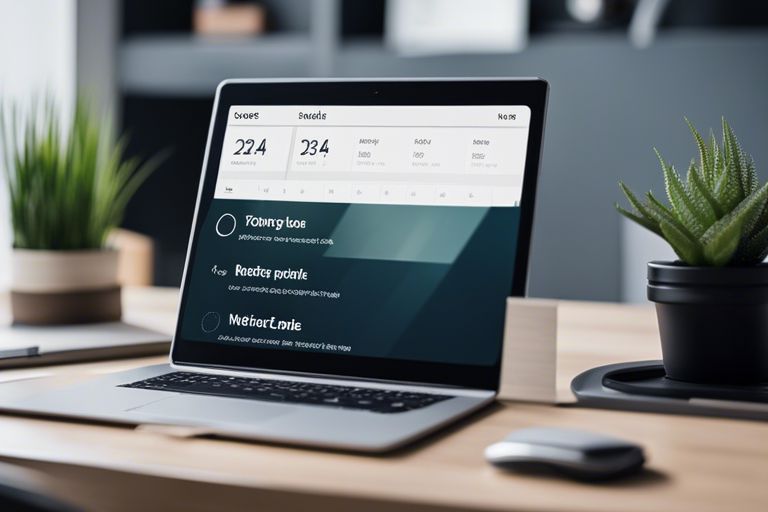The Importance of Effective Task Management
To ensure the successful completion of projects, effective task management plays a pivotal role. By understanding project task management and mastering its techniques, individuals can enhance their productivity and organization skills, leading to more efficient project execution.
Understanding Project Task Management
Project task management involves the process of planning, organizing, and executing tasks within a project. It provides a structured approach to manage the various components and deliverables of a project, ensuring that all tasks are completed in a timely and efficient manner.
At its core, project task management involves breaking down a project into smaller, manageable tasks, assigning responsibilities, setting deadlines, and monitoring progress. This approach allows individuals and teams to have a clear understanding of the project’s objectives, deliverables, and timelines.
By implementing effective project task management practices, individuals gain better control over their projects. They can prioritize tasks, allocate resources effectively, and ensure that all project components are aligned towards achieving the overall project goals.
Benefits of Mastering Task Management
Mastering task management brings several benefits to individuals and teams involved in project execution. Here are some key advantages:
Improved Productivity: Effective task management enables individuals to stay organized and focused on their work. By breaking down projects into smaller tasks and setting clear goals, individuals can better manage their time and resources, improving overall productivity.
Enhanced Collaboration: Task management promotes collaboration and communication among team members. By assigning tasks and responsibilities, team members know their roles and can coordinate efforts more efficiently, leading to smoother project execution.
Better Time Management: Efficient task management helps individuals prioritize their work and allocate time effectively. By setting deadlines and monitoring progress, individuals can ensure timely completion of tasks, avoiding delays and bottlenecks.
Reduced Stress and Overwhelm: When projects are properly managed with clear task assignments and timelines, individuals experience reduced stress and overwhelm. They have a clear roadmap to follow and can approach their work in a more organized and systematic manner.
By understanding the foundations of project task management and implementing effective strategies, individuals can experience improved productivity, better collaboration, and reduced stress levels. In the following sections, we will explore various techniques and tools that can help individuals maximize their task management efforts. To learn more about task management software, task management apps, and other tools, check out our article on task management tools.
Getting Started with Task Management
To maximize productivity and stay organized, it’s essential to have effective task management strategies in place. This section will cover two crucial aspects of task management: setting clear goals and objectives, and breaking down projects into manageable tasks.
Setting Clear Goals and Objectives
Before diving into task management, it’s important to establish clear goals and objectives for your projects. Setting specific, measurable, attainable, relevant, and time-bound (SMART) goals provides a clear direction and helps maintain focus throughout the project.
By defining your goals and objectives, you can create a roadmap that outlines the tasks and milestones necessary to achieve them. This clarity enables you to prioritize your efforts and allocate resources effectively. Additionally, communicating the goals and objectives to your team members or stakeholders helps align everyone’s efforts and ensures a shared understanding of the project’s purpose.
To learn more about effective goal setting, check out our article on task management best practices.
Breaking Down Projects into Tasks
Once you have established clear goals and objectives, the next step is to break down the projects into smaller, manageable tasks. Breaking down projects helps prevent overwhelm and allows for better planning and execution.
Start by identifying the major components or deliverables required to achieve your goals. Then, divide these components into smaller tasks that are easier to tackle. Each task should be specific, actionable, and have a clear outcome. By breaking down projects into tasks, you create a roadmap that guides your progress and allows for better tracking and accountability.
Consider using a task management tool or software, such as task management software or task management apps, to keep your tasks organized and easily accessible. These tools often provide features like task assignment, due dates, and progress tracking, empowering you to stay on top of your projects.
Here’s an example of how a project can be broken down into tasks:
| Project: Launching a New Website |
|---|
| Tasks |
| 1. Conduct market research |
| 2. Define website requirements |
| 3. Create wireframes and design concepts |
| 4. Develop website structure and navigation |
| 5. Design and develop website pages |
| 6. Implement SEO strategies |
| 7. Test website functionality |
| 8. Launch the website |
| 9. Monitor website performance |
Breaking down projects into tasks not only enhances productivity but also provides a sense of accomplishment as you complete each task. It allows you to focus on the immediate steps required to achieve your goals, making the overall project more manageable.
By setting clear goals and breaking down projects into tasks, you lay a solid foundation for effective task management. These practices help provide direction, maintain focus, and ensure that you make progress towards your desired outcomes.
Choosing the Right Task Management Tools
To effectively manage tasks and projects, it’s essential to have the right tools at your disposal. Task management tools can help streamline your workflow, improve organization, and enhance productivity. Let’s explore three common types of task management tools: task management software, project management apps, and digital calendars with to-do lists.
Task Management Software
Task management software is designed to facilitate the planning, tracking, and collaboration of tasks and projects. These software solutions provide features such as task assignment, progress tracking, and deadline management. They also often offer integrations with other tools, allowing for seamless workflow management.
Task management software provides a centralized platform where teams can collaborate, communicate, and stay updated on project progress. Some popular task management software options include Asana, Trello, and Monday.com. These tools offer a range of functionalities to suit different project management needs.
Project Management Apps
Project management apps are mobile applications designed to help individuals and teams manage tasks and projects on the go. These apps often provide features similar to task management software but in a more compact and portable format. They allow users to create, assign, and track tasks, set deadlines, and collaborate with team members from their mobile devices.
With project management apps, you can access your task lists, make updates, and communicate with your team members regardless of your location. Some popular project management apps include Todoist, Wunderlist, and Microsoft To Do.
Digital Calendars and To-Do Lists
Digital calendars and to-do lists are simple yet effective tools for task management. These tools allow you to schedule tasks, set reminders, and keep track of deadlines. Digital calendars can provide a visual overview of your tasks and help you allocate time effectively.
To-do list apps and digital calendars are often integrated into productivity suites, such as Google Workspace and Microsoft Office. These suites offer a range of productivity tools, including email, document editing, and task management, all in one place.
| Task Management Tool | Features |
|---|---|
| Task Management Software | – Task assignment – Progress tracking – Deadline management – Collaboration features |
| Project Management Apps | – Mobile accessibility – Task creation and tracking – Deadline management – Team collaboration |
| Digital Calendars and To-Do Lists | – Task scheduling – Reminder setting – Time management |
Choosing the right task management tool depends on your specific needs, preferences, and the complexity of your projects. Some individuals may find task management software more suitable for team collaboration, while others may prefer the simplicity and portability of project management apps. Digital calendars and to-do lists can be effective for individuals seeking a straightforward solution for personal task management.
Remember, the key is to find a tool or combination of tools that align with your workflow and enable you to stay organized, focused, and productive. For more information on effective task management strategies, check out our article on effective task management strategies.
Strategies for Effective Task Management
To maximize productivity and ensure project success, implementing effective task management strategies is essential. By prioritizing tasks, setting deadlines, and leveraging collaboration, individuals can streamline their workflow and achieve their goals more efficiently.
Prioritizing Tasks
Prioritizing tasks is a fundamental aspect of effective task management. By determining the importance and urgency of each task, individuals can allocate their time and resources accordingly. There are various methods for prioritizing tasks, such as the Eisenhower Matrix, ABC Analysis, or the MoSCoW method. These techniques help individuals identify and focus on high-priority tasks that contribute directly to project objectives.
| Method | Description |
|---|---|
| Eisenhower Matrix | A 2×2 matrix that categorizes tasks based on their urgency and importance. |
| ABC Analysis | Assigning tasks to categories (A, B, C) based on their priority level. |
| MoSCoW Method | Categorizing tasks as Must-haves, Should-haves, Could-haves, and Won’t-haves. |
To learn more about different task prioritization methods, check out our article on task prioritization methods.
Setting Deadlines
Setting deadlines for tasks is crucial to keep projects on track and ensure timely completion. By establishing specific due dates, individuals can create a sense of urgency and maintain accountability. When setting deadlines, it’s important to consider the complexity of the task, the availability of resources, and any dependencies on other tasks. Breaking down larger projects into smaller, manageable tasks with individual deadlines can also help maintain momentum and avoid overwhelming workloads.
Delegating and Collaborating
Delegating tasks and fostering collaboration among team members is another effective strategy for task management. By leveraging the skills and expertise of others, individuals can distribute workloads, increase efficiency, and promote a sense of shared responsibility. Delegation involves identifying tasks that can be effectively handled by others and assigning them accordingly. Collaborating with team members not only helps in task execution but also encourages knowledge sharing, creativity, and problem-solving.
To facilitate effective delegation and collaboration, there are various task management tools and task management software available. These tools provide features like task assignment, progress tracking, and communication channels to streamline teamwork and enhance productivity.
By implementing these strategies for effective task management, individuals can optimize their workflow, stay organized, and accomplish project goals efficiently. Remember to regularly review and update tasks as needed to adapt to changing priorities or project requirements. For more insights and best practices on task management, explore our article on task management best practices.
Techniques for Successful Task Execution
To effectively execute tasks and maximize productivity, it’s essential to employ the right techniques. In this section, we will explore three popular techniques: time blocking, the Pomodoro Technique, and agile task management.
Time Blocking
Time blocking is a technique that involves scheduling specific time blocks for different tasks or activities. By allocating dedicated time slots for each task, individuals can enhance focus and minimize distractions. This technique helps create a structured workflow, ensuring that important tasks receive the attention they deserve.
To implement time blocking effectively, start by identifying the tasks that need to be completed. Then, allocate specific time periods for each task based on priority and estimated time requirements. Block out distractions during these time slots and focus solely on the designated task. Using a digital calendar or a planner can be helpful in visualizing and organizing your time blocks.
Time blocking allows you to have a clear overview of your day and ensures that you allocate sufficient time for each task. By sticking to the allocated time blocks, you can improve productivity and maintain better control over your schedule. For a detailed discussion on effective time management strategies, check out our article on effective task management strategies.
Pomodoro Technique
The Pomodoro Technique is a time management method that involves breaking work into focused intervals, typically 25 minutes, called “Pomodoros.” After each Pomodoro, a short break of around 5 minutes is taken. After completing a set number of Pomodoros, typically four, a longer break of 15-30 minutes is taken.
This technique helps manage time effectively by dividing work into manageable chunks and maintaining a balance between productivity and rest. The structured intervals encourage focused work during each Pomodoro, while the short breaks provide an opportunity to recharge and prevent burnout.
To utilize the Pomodoro Technique, start by setting a timer for 25 minutes and dedicate your complete focus to the task at hand. Once the timer goes off, take a short break, allowing yourself to relax and recharge. Repeat this process for a predetermined number of Pomodoros before taking a more extended break. This technique can be especially beneficial for tasks that require intense concentration.
Agile Task Management
Agile task management is a project management approach that emphasizes adaptability, collaboration, and continuous improvement. Originally developed for software development, agile methodologies have extended to various industries, providing a flexible framework for managing tasks efficiently.
The core principles of agile task management include breaking down projects into smaller, manageable tasks, prioritizing work based on value and urgency, and regularly reviewing and adjusting tasks as needed. Agile methodologies promote collaboration and communication among team members, fostering a dynamic and iterative work process.
By adopting agile task management, individuals and teams can respond to changing priorities, address challenges promptly, and ensure that tasks align with project objectives. Agile methodologies, such as Scrum or Kanban, offer frameworks and tools that support effective task management for teams. For more information on managing tasks within a team, refer to our article on task management for teams.
By utilizing techniques like time blocking, the Pomodoro Technique, and agile task management, individuals can enhance their task execution capabilities and improve productivity. Experiment with these techniques to find the approach that works best for you, keeping in mind the specific requirements of your tasks and personal preferences.
Tips for Maintaining Productivity and Organization
To maximize productivity and maintain organization, it’s essential to implement effective strategies and techniques in task management. Here are some tips to help you stay focused, minimize distractions, and keep your tasks on track.
Avoiding Multitasking
While multitasking may seem like a way to get more done in less time, it can actually hinder productivity. Jumping between multiple tasks simultaneously can lead to decreased efficiency and increased errors. Instead, focus on one task at a time and give it your full attention. By dedicating your energy to a single task, you’ll be able to complete it more efficiently and with better quality.
Managing Distractions
Distractions can significantly derail your productivity. To minimize distractions, create an environment that is conducive to focused work. Find a quiet space, turn off notifications on your devices, and let others know that you need uninterrupted time to concentrate on your tasks. If you find it challenging to resist the temptation of distractions, consider using website blockers or productivity apps that can limit access to distracting websites or apps.
Regularly Reviewing and Updating Tasks
Regularly reviewing and updating your tasks is crucial for staying organized and ensuring that you’re working on the most important and relevant tasks. Set aside time each day or week to review your task list and make any necessary updates. This allows you to assess your progress, reprioritize tasks if needed, and ensure that you’re on track to meet your goals. By regularly reviewing and updating your tasks, you can stay organized and focused on what matters most.
In addition to these tips, utilizing the right task management tools can greatly enhance your productivity and organization. Task management software, project management apps, digital calendars, and to-do lists can help streamline your task management process and keep all your tasks in one place. These tools often offer features such as task tracking, reminders, collaboration options, and integrations with other productivity tools. Explore different options and choose the tools that best suit your needs.
Remember, effective task management is a continuous process that requires discipline and regular practice. By avoiding multitasking, managing distractions, and regularly reviewing and updating your tasks, you’ll be well on your way to maintaining productivity and organization in your projects. For more insights and strategies on effective task management, check out our article on task management best practices.








